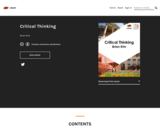
Critical thinking is the ability to think clearly and rationally about what to do or what to believe. It includes the ability to engage in reflective and independent thinking. Someone with critical thinking skills is able to do the following:
Understand the logical connections between ideas.
Identify, construct, and evaluate arguments.
Detect inconsistencies and common mistakes in reasoning.
Solve problems systematically.
Identify the relevance and importance of ideas.
Reflect on the justification of one’s own beliefs and values.
Critical thinking is not simply a matter of accumulating information. A person with a good memory and who knows a lot of facts is not necessarily good at critical thinking. Critical thinkers are able to deduce consequences from what they know, make use of information to solve problems, and to seek relevant sources of information to inform themselves.
Critical thinking should not be confused with being argumentative or being critical of other people. Although critical thinking skills can be used in exposing fallacies and bad reasoning, critical thinking can also play an important role in cooperative reasoning and constructive tasks. Critical thinking can help us acquire knowledge, improve our theories, and strengthen arguments. We can also use critical thinking to enhance work processes and improve social institutions.
Some people believe that critical thinking hinders creativity because critical thinking requires following the rules of logic and rationality, whereas creativity might require breaking those rules. This is a misconception. Critical thinking is quite compatible with thinking “out-of-the-box,” challenging consensus views, and pursuing less popular approaches. If anything, critical thinking is an essential part of creativity because we need critical thinking to evaluate and improve our creative ideas.
- Subject:
- Language, Philosophy, and Culture
- Philosophy
- Material Type:
- Textbook
- Provider:
- Oklahoma State University
- Author:
- Brian Kim
- Date Added:
- 06/03/2021